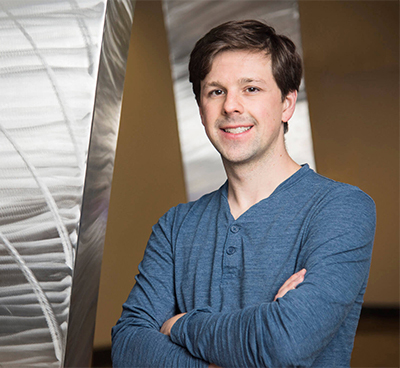Gleich selected as University Faculty Scholar
11-23-2021

David Gleich, the Jyoti and Aditya Mathur Associate Professor of Computer Science, with a courtesy appointment in the Department of Mathematics, was selected as a University Faculty Scholar by the Office of the Provost.
The University Faculty Scholars Program recognizes outstanding faculty members who are on an accelerated path for academic distinction. Recipients of this honor have the rank of tenured associate or full professor and have been in that rank for no more than five years. Faculty scholars are nominated by their academic areas, reviewed by a committee in the College of Science, and approved by the provost. Faculty Scholars are appointed for a five-year term and receive an annual $10,000 discretionary allocation to support their research. The program was created in 1998. Professor Gleich will begin his five-year term on July 1, 2022.
Professor Gleich’s research is focused on high performance and large scale computations with a focus on enabling previously infeasible analysis of data from biology, social networks, and scientific simulations. Matrix algebra is a particularly attractive paradigm to study these procedures as it often gives rise to efficient computational procedures in a variety of settings (serial, parallel, streaming). This research straddles a few different areas and often involves working with large datasets on high performance computing architectures (e.g. MPI clusters) and data computing architectures (e.g. MapReduce).
Gleich held the John von Neumann post-doctoral fellowship at Sandia National Laboratories in Livermore, CA before joining Purdue in Fall 2011. Since then, he received an NSF CAREER Award in 2011 for work on modern methods for computing functions of matrices such as the matrix exponential, a challenging social network analysis metric.
About the Department of Computer Science at Purdue University
Founded in 1962, the Department of Computer Science was created to be an innovative base of knowledge in the emerging field of computing as the first degree-awarding program in the United States. The department continues to advance the computer science industry through research. US News & Reports ranks Purdue CS #20 and #18 overall in graduate and undergraduate programs respectively, ninth in both software engineering and cybersecurity, 14th in programming languages, 13th in computing systems, and 24th in artificial intelligence. Graduates of the program are able to solve complex and challenging problems in many fields. Our consistent success in an ever-changing landscape is reflected in the record undergraduate enrollment, increased faculty hiring, innovative research projects, and the creation of new academic programs. The increasing centrality of computer science in academic disciplines and society, and new research activities - centered around data science, artificial intelligence, programming languages, theoretical computer science, machine learning, and cybersecurity - are the future focus of the department. cs.purdue.edu
Writer: Emily Kinsell, emily@purdue.edu
|
Ninghui Li |
2016-2021 |
|
Jennifer Neville |
2020-2025 |
|
Ananth Grama |
2002-2007 |
|
Walid Aref |
2004-2009 |
|
Zhiyuan Li |
2005-2010 |
|
Suresh Jagannathan |
2007-2012 |
|
Sunil Prabhakar |
2009-2014 |
|
Dongyan Xu |
2012-2017 |
|
Daisuke Kihara |
2013-2018 |
|
Xiangyu Zhang |
2014-2019 |
|
Sonia Fahmy |
2015-2020 |